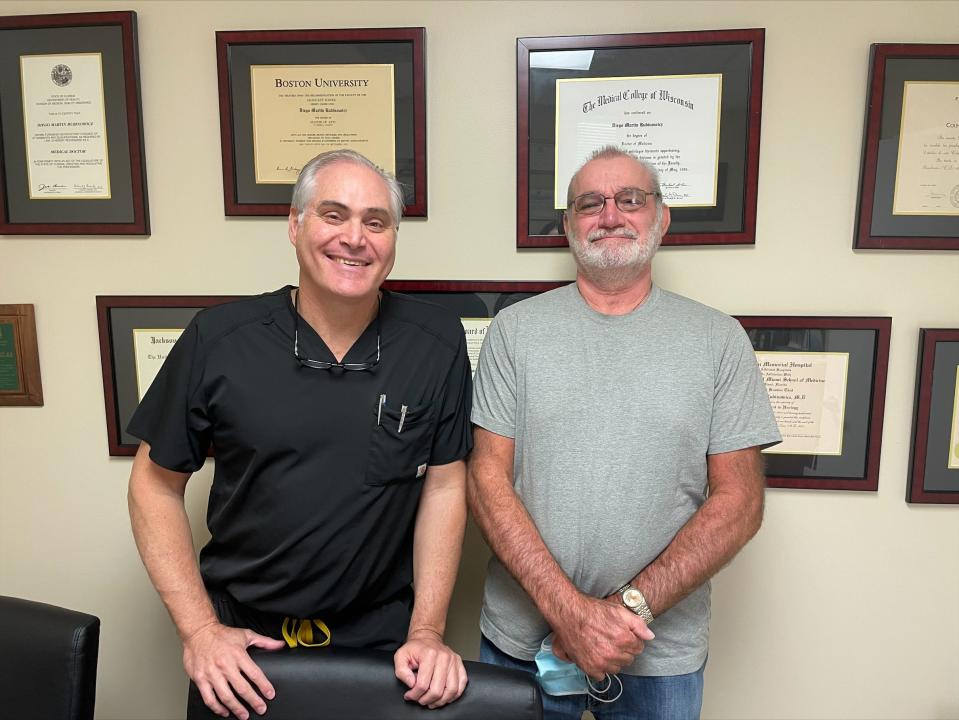Terry Bradshaw reveals recent battles with cancer; what you need to know

- Oops!Something went wrong.Please try again later.
Terry Bradshaw gave his millions of fans quite a scare a few weeks ago.
On Oct. 2, the Hall of Fame quarterback, who led the Pittsburgh Steelers to four Super Bowl titles during his 14-year career and has been a commentator on the FOX NFL Sunday studio show since the network began airing NFL games in 1994, addressed an incident that happened on air the previous week.
“I ran out of breath and Howie [Long] helped me off and a lot of people have asked what’s wrong with me, what’s happened to me physically," he said. "I just want to address it and let you know what has happened in my life."
More from Dorfman: A fan's fear for quarterback Tua Tagovailoa: 'I can't watch — but I can't look away'
More on cancer treatment: Learn how FAU researchers are battling cancer at free town hall Wednesday
More football: NFL's 'new commissioner' making some changes to better the game - Opinion

He then went on to explain that he was diagnosed with bladder cancer in November 2021 and then in March was found to have rare form of skin cancer on his neck called Merkel cell cancer.
After separate treatments at separate facilities for the two conditions — which included surgeries for each — he said his doctors have deemed him cancer-free.
“Folks, I may not look my old self, but I feel like my old self,” said the 74-year-old NFL legend, who has also starred on the E! Network reality show "The Bradshaw Bunch."
“I’m cancer-free. I’m feeling great,” he said.
Understanding bladder cancer
While both of Bradshaw’s cancers were potentially life-threatening, because bladder cancer is so much more prevalent than Merkel cell cancer, let’s concentrate on the former.
According to the U.S. Centers for Disease Control, around 75,000 Americans — 57,000 men and 18,000 women — are diagnosed with bladder cancer annually.
Loxahatchee urologist Dr. Diego Rubinowicz, owner of Urology Center of Palm Beach, says the primary risk factor for developing bladder cancer is being a cigarette smoker.
“Bladder cancer is mainly caused by cigarette smoking or exposure to tobacco, including secondhand smoke,” explains Rubinowicz.
Some studies, he says, have also associated bladder cancer with the chemicals used in the rubber industry, as well as in certain heavy metals, fluorocarbons, and hair dyes.
He also notes that “there are other rare causes of bladder cancer such as chronic bladder irritation and chronic infections, including chronic indwelling catheters.”
The most common early symptom of bladder cancer is blood in one’s urine. Rubinowicz says some of his patients have experienced a burning sensation (known as dysuria) when urinating.
Rubinowicz urges anyone who notices blood in his or her urine — even if the condition apparently resolves itself on its own — should see a urologist immediately.
“Even though other conditions can cause blood in the urine, cancer needs to be ruled out first,” he says.
Bladder cancer is usually diagnosed via a cystoscopy, which is a direct inspection into the bladder with a camera. This minimally invasive procedure can be done in a doctor’s office or as an outpatient in a hospital.
Bladder cancer treatment
Bladder cancer treatment is determined by the stage and grade of the tumor or lesion.
For instance, Rubinowicz says that superficial lesions may need endoscopic (transurethral) excision followed by intravesical chemotherapy (i.e., chemo medication that is delivered straight into the bladder via catheter) or immunotherapy.
Conversely, deeper lesions may need other, more involved treatments such as bladder resection (removing part or all of the bladder) and/or standard systemic chemotherapy.
“In patients who are not candidates for this kind of major surgery, there is a protocol involving chemotherapy and radiation therapy,” says Rubinowicz.
For patients with a “low-grade” form of the disease, there is a high likelihood of recurrence.
“I’d say it happens around 70% of the time with low-grade bladder cancer, so these patients require vigilant follow-up exams,” Rubinowicz says.
One patient who knows this all too well is 70-year-old Michael Anthes of Royal Palm Beach.

In 2015, after noticing blood in his urine, Anthes made an appointment with Rubinowicz.
A scan showed a small growth in his bladder — so, he said, “I had it removed immediately.”
Anthes — a long-time smoker who quit the habit around 15 years ago — went for his follow-up exam a few months later and learned “the growth had returned. That has become my pattern with this disease for the last seven years. Every six months or so, Dr. Rubinowicz has been doing surgeries to remove lesions in my bladder.”
Because of the frequency of his recurrences, Anthes also undergoes weekly infusions of medication aimed at preventing the disease from advancing.
Despite bladder cancer being a constant presence in his life, Anthes doesn’t stress too much about his condition: “For me, it’s not a big deal. My philosophy is I either deal with this problem or I die. And I don’t want to die for a very long time.”
This article originally appeared on Palm Beach Post: Terry Bradshaw revealed cancer battles, signs you should go to the doctor

